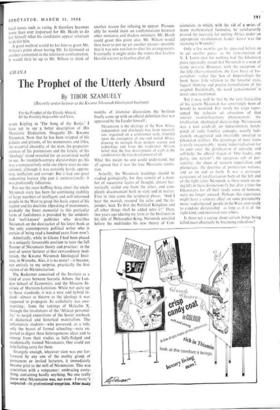GHANA
The Prophet of the Utterly Absurd
By TIBOR SZAMUELY
(Recently senior lecturer at the Kwame Nkrumah Ideological Institute) I'm the Prophet of the Utterly Absurd, Of the Patently Impossible and Vain,
wrote Kipling in 'The Song of the Banjo.' I have yet to see a better description of His Messianic Dedication, Osagyefo Dr. Kwame Nkrumah. Now that he has been stripped of his palaces and prisons, of his monuments and titles, the essential absurdity of the man, the preposter- ousness of his pretensions and the fatuity of his 'ideology' stand revealed for an astonished world to see. As twentieth-century dictatorships go, his was a comparatively mild one (there were no exe- cutions), although it was certainly harsh, oppres- sive, inefficient and corrupt. But it had one great redeeming feature (the pun is unintentional): it was profoundly ridiculous.
For me the most baffling thing about the whole Nkrumah story has been the continuing inability of large numbers of intelligent and well-informed people in the West to grasp this basic aspect of his regime and his doctrine. (Speaking of monuments, probably the finest memorial to this particular form of foolishness is provided by the unidenti- fied 'well-known' publisher who describes Nkrumah on the dust-jacket of his latest book as 'the only contemporary political writer who is certain of being read a hundred years from now').
Admittedly, while in Ghana I had been placed in a uniquely favourable position to taste the full flavour of Nkrumaist theory and practice: in the post of senior lecturer at that extraordinary insti- tution, the Kwame Nkrumah Ideological Insti- tute, in Winneba. Alas, it is no morel—it became, not entirely to my surprise, practically the first victim of de-Nkrumaisation.
The Redeemer conceived of the Institute as a kind of cross between Socratic Athens, the Lon- don School of Economics, and the Moscow In- stitute of Marxism-Leninism. While not quite up to those standards, it was a very odd hybrid in- deed—almost as bizarre as the ideology it was supposed to propagate. Its catholicity was awe- inspiring : from the rantings of Malcolm X, through the involutions of the 'African personal- ity,' to turgid expositions of the Soviet textbook of dialectical and historical materialism. The unfortunate students—who possessed, as a rule, only the barest of formal schooling—were ex- pected to digest these heterogeneous ideas and to emerge from their studies as fully-fledged and academically trained Nkrumaists. One could not help feeling sorry for them.
Strangely enough, whatever view was put for- forward by any one of the motley group of Permanent or invited lecturers, it immediately became grist to the mill of Nkrumaism. This was syncretism with a vengeance: embracing every- thing, containing hardly anything. No one really knew what Nkrumaism was, not even—I stronCy suspected—its professional exegetists. After many
months of intensive discussions the Institute finally came up with an official definition that was approved by the Leader himself :
Nkrumaism is the ideology of the New Africa, independent and absolutely free from imperial- ism, organised on a continental scale, founded upon the conception of one and united Africa, drawing its strength from modern science and technology and from the traditional African belief that the free development of each is the condition for the free development of all.
What this meant no one could understand, but all agreed that it was the true Messianic revela- tion.
Actually, the Nkrumaic teachings should be studied geologically, for they consist of a num- ber of successive layers of thought, almost her- metically sealed one from the other, and com- pletely disconsonant both in style and in matter. First in time came the scriptural phase: 'And I hear the mortals resound the echo and the re- joinder, Seek Ye first the Political Kingdom and all other things shall be added unto it!' Then, two years ago (during my term at the Institute) in his role of Philosopher-King, Nkrumah unveiled before the multitudes his new theory of Con- sciencism, in which, with the aid of a series of inane mathematical formulae, he satisfactorily proved the necessity for uniting Africa under an appropriate revolutionary leader. Great was the rejoicing in Winneba!
Only a few months ago he appeared before us in yet another guise : as the reincarnation of V. I. Lenin (not for nothing had the Ghanaian press repeatedly stated that Nkrumah is a man of many avatars). However, with the exception of the title (Neo-colonialism, the. Last Stave of Im- perialism--rather like Son of Imperialism) the book bears little relation to the forceful style,
logical thinking and precise formulations of the original. Incidentally, the word 'consciencism' is never once mentioned.
Yet it may well be that by the very farcicality of his system Nkrumah has unwittingly been of benefit to mankind. For surely his reign repre- sented the reductio ad absurdum of that sinister twentieth-century phenomenon : the
totalitarian, ideological dictatorship. Nkrumaism was a vast catch-all, an indiscriminate hotch- potch of sadly familiar concepts, usually ludi- crously exaggerated and invariably unsuited to Ghanaian realities. The parentage of most items is easily recognisable: manic industrialisation for
its own sake; the glorification of autarchy and
self-help; the official slogan of 'One leader, one party, one nation ! '; the egregious cult of per- sonality; the abuse of western imperialism and
plutocracy; the doctrine of proletarian nations; and so on and so forth. It was a grotesque caricature of totalitarianism both of the left and
of the right (after Nkrumah, is there much mean- ing left in these distinctions?), but after a time the Ghanaians, for all their ready sense of humour, were no longer amused. Perhaps this experience might have a salutary effect on some presumably more 'sophisticated' people in the West, ever ready to condone dictatorship --as long as it is of the right kind, and exercised over others.
Is there not a saying about certain things being killed most effectively by becoming ridiculous?






































 Previous page
Previous page